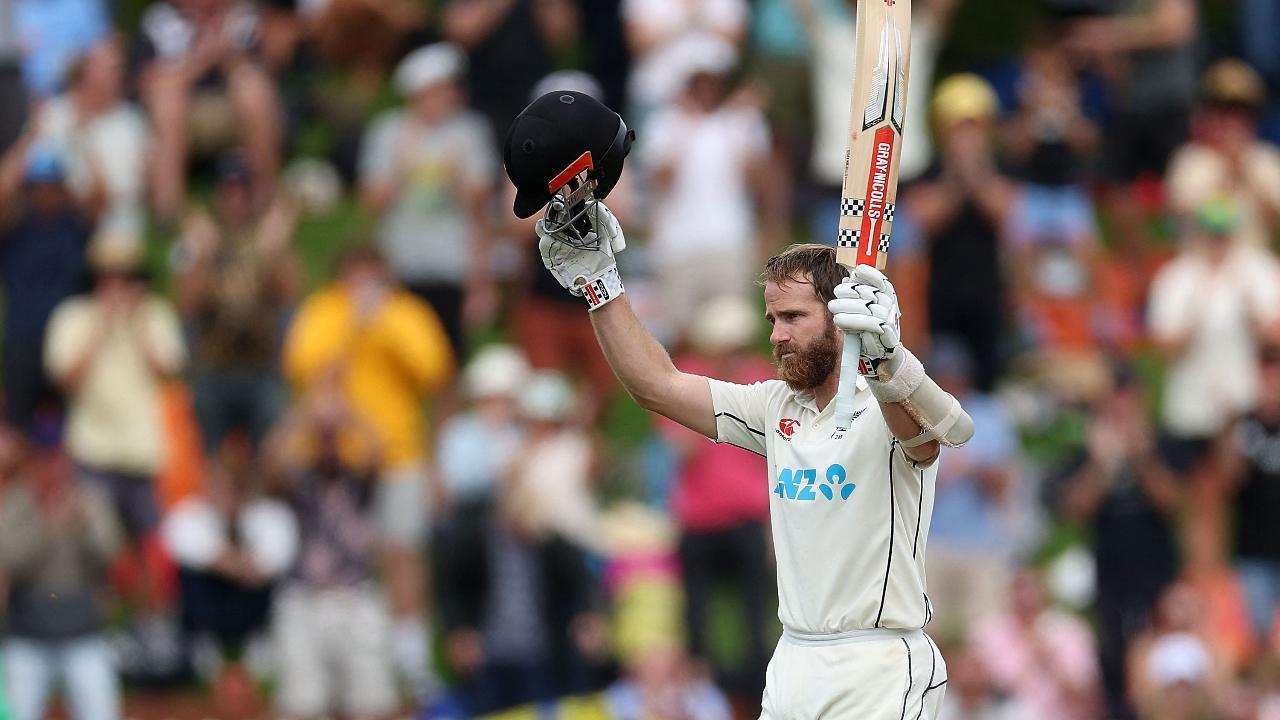Kane Williamson was officially and unofficially New Zealand's best batsman on the fourth day of the second Test Monday as his 26th Test century allowed New Zealand to lead England by 257 runs after following on

New Zealand's Kane Williamson celebrates 100 runs during day four of the second cricket Test match between New Zealand and England at the Basin Reserve in Wellington on February 27, 2023. (Pic Courtesy: AFP)
Kane Williamson was officially and unofficially New Zealand's best batsman on the fourth day of the second Test Monday as his 26th Test century allowed New Zealand to lead England by 257 runs after following on.
Kane Williamson was officially and unofficially New Zealand's best batsman on the fourth day of the second Test Monday as his 26th Test century allowed New Zealand to lead England by 257 runs after following on.
Tom Blundell made 90 and was the last man out as New Zealand's second innings ended at 483 less than an hour before stumps.
Under New Zealand-born head coach Brendon McCullum, England already has pulled off its highest successful run chase in tests, scoring 378 to beat India at Edgbaston last year. This chase for 258 with more than 100 overs available would seem a walk in the park by comparison.
Tim Southee removed Zac Crawley (24) with a ball that cut back to hit off peg and at stumps England was 48-1, needing 210 from 103 overs on the last day to sweep the two-match series.
The odds still heavily favour the visitors but Williamson at least has given New Zealand hope.
When he reached 29 on his way to 132, he became New Zealand's highest run-scorer in Tests, overtaking his former teammate Ross Taylor, who ended his career last year with 7,682 runs.
Also Read: New Zealand 325-5, leads England by 99 at lunch on Day 4 of 2nd Test
And in batting for all of the fourth day, in productive partnerships with Henry Nicholls, Daryl Mitchell and Tom Blundell, Williamson guided New Zealand from a 226 run deficit when England enforced the follow-on Sunday to a respectable lead.
I don't sort of think too much about records,¿ Williamson said. ¿It's all about the team and the position you're in and trying to do more.
It was nice to be part of some partnerships today and get a pretty good second innings effort on the board. Having said that you always want more and we were hoping for a few more in terms of the position we got ourselves into. But all to play for tomorrow.
After making only 10 runs in his previous three innings in the series, Williamson showed why he is New Zealand's best batsman when the chips are down. The match was in the balance at the start of the day: New Zealand was 202-3, still 24 runs behind England who just had taken the second new ball.
Williamson and Nicholls (29) erased the deficit by the ninth over and saw off the new ball in a partnership of 55 for the fourth wicket.
Daryl Mitchell came in after Nicholls, when Williamson was 34, and rushed past Williamson to a half century from 52 balls. Williamson reached his own half century soon after from 148 deliveries and in just over four hours, reflecting the extent of his patience and application.
Mitchell was out for 54 in a 75-run partnership with Williamson, at the end of which New Zealand's lead was 71. Them came Tom Blundell, the first test century-maker, who provided Williamson with the extended support he needed to gradually improve New Zealand's position.
Williamson had batted for 7-1/2 hours when England, having explored every reasonable means of removing him, gave Harry Brook his first bowl in test cricket. Brook's bowling style officially is described as right-arm medium. In reality it might be called dribbly medium pace.
But it was Brook who finally ended Williamson's innings and claimed a first test wicket, which will give him bragging rights for years to come.
The decisive ball was gentle and unthreatening, pitching short and heading down leg side. Williamson closed up his guard to glance behind square and the ball glanced across the bat en route to wicketkeeper Ben Foakes.
England's appeal for the catch behind was rejected. The tourists reviewed the call, and the replay showed the faintest of edges, as England erupted in celebration.
When Williamson was out, New Zealand's resistance was broken and the end came quickly. Michael Bracewell paid the price for casual running between wickets and Jack Leach dismissed Tim Southee and Matt Henry in the same over.
Leach also ended Blundell's four-hour innings but by that stage, including the first innings, England had been in the field for more than 215 overs.
This story has been sourced from a third party syndicated feed, agencies. Mid-day accepts no responsibility or liability for its dependability, trustworthiness, reliability and data of the text. Mid-day management/mid-day.com reserves the sole right to alter, delete or remove (without notice) the content in its absolute discretion for any reason whatsoever
 Subscribe today by clicking the link and stay updated with the latest news!" Click here!
Subscribe today by clicking the link and stay updated with the latest news!" Click here!










